"Olympian, African champion, Chasing more glory at 41" - This is my story - Radhouane Slimane
MONASTIR (Tunisia) - Not many 40-year-old players remain as hungry for trophies as Tunisian Radhouane Slimane, a man trying to change the narrative.
MONASTIR (Tunisia) - Not many 40-year-old players remain as hungry for trophies as Tunisian Radhouane Slimane, a man trying to change the narrative.
After almost two decades as a professional baller, Slimane could be enjoying his retirement now, he could also be on the sidelines sharing his experience as a coach, instead, the 2,05m (6ft 9in) forward continues to play and chasing more silverware to his already-filled trophy cabinet.
"THIS YEAR MUST BE THE LAST CHANCE FOR MY GENERATION TO WIN ONE MORE AFRICAN CHAMPIONSHIP. PLAYERS LIKE MYSELF, SALAH [MEJRI], [MOHAMED] HADIDANE, [OMAR] MOUHLI MIGHT RETIRE FROM THE NATIONAL TEAM AFTER KIGALI."
Slimane - or "Sekka" as he's known in Tunisian basketball scene - has helped his country to their two African titles in 2011 and 2017. He's enriched his trophy cabinet with a FIBA Africa Champions Cup 2011 title, a year later he became an Olympian in London. He is also a two-time FIBA Basketball World Cup participant, and he shows no sign of slowing down.
His average of 7.7 points and 3.7 rebounds in six FIBA AfroBasket 2021 Qualifiers games speak volumes about his intention of keep on going.
And, if he stays healthy until the start of the next FIBA AfroBasket in August in Kigali, Slimane stands strong chances of making the reigning African champions' final roster.
Slimane, who will turn 41 eight days before the start of the AfroBasket 2021, took time out of his busy club schedule with Tunisian champions US Monastir to recall how he took up basketball, and relives some of the turning points of his career.
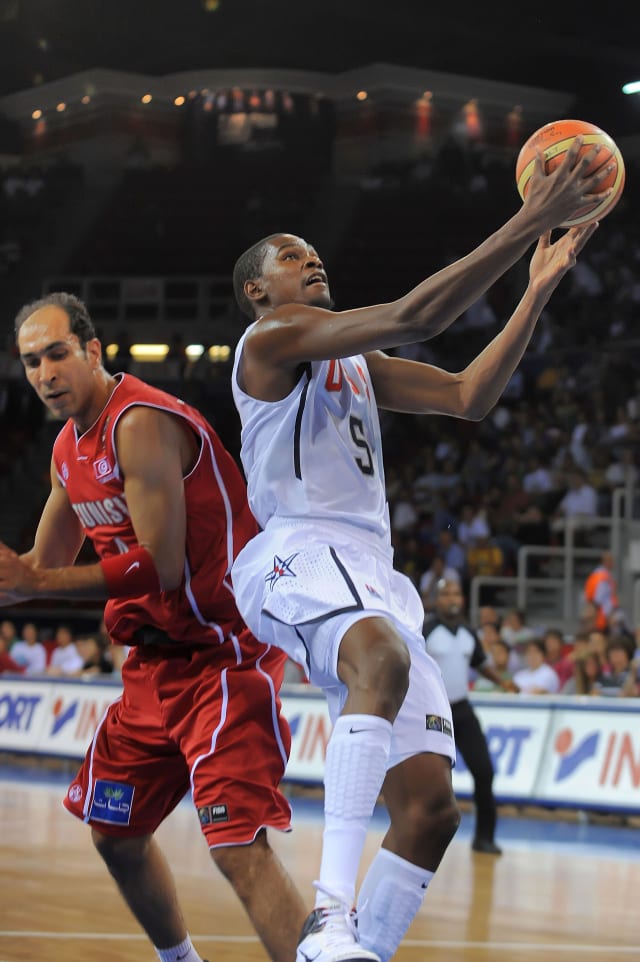 Radhouane Slimane vs Kevin Durant at 2010 FIBA Basketball World Cup in Turkey
Radhouane Slimane vs Kevin Durant at 2010 FIBA Basketball World Cup in Turkey
I was born in the Tunisian city of Kairouan, and I picked basketball at an early age, primarly because basketball is really popular there.
Unlike many players who transitioned from football to basketball, for me, basketball was always the number one sport.
Back in the days, we had a good generation of players in Kairouan, and the game of basketball was very much part of our daily lives.
After winning many trophies in youth tournaments, I thought it was about time to experience other basketball environments, and I grabbed an opportunity of playing for JSK Kairouan senior team with both hands.
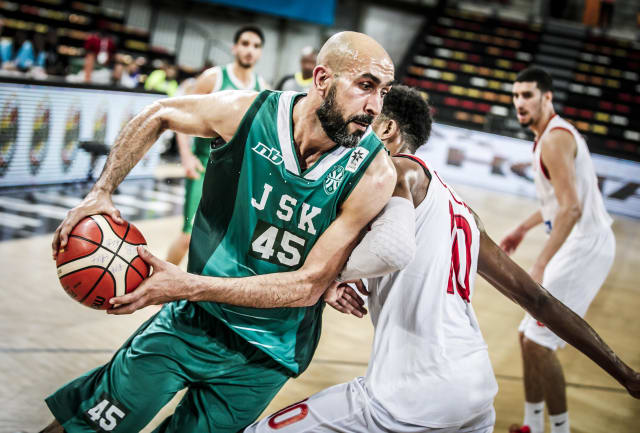 Slimane Radhouane last played for his local JSK Kairouan at 2019 FIBA Africa Basketball League
Slimane Radhouane last played for his local JSK Kairouan at 2019 FIBA Africa Basketball League
It didn't take long before scouts and coaches started to notice my basketball talent.
Soon after, the national team came calling, and, it was at that time that I realised that my hard work had paid off.
So, I played my first AfroBasket in Morocco in 2001. I was 21 at the time. We played great in that tournament, we reached the Semi-Final, but we lost to Algeria by one point. Had we won the semis, we would have qualified for the 2002 FIBA Basketball World Cup in Indianapolis. Losing by one against a team that we had beaten by 15 twice in warm-up games prior to the AfroBasket was a tough pill to swallow.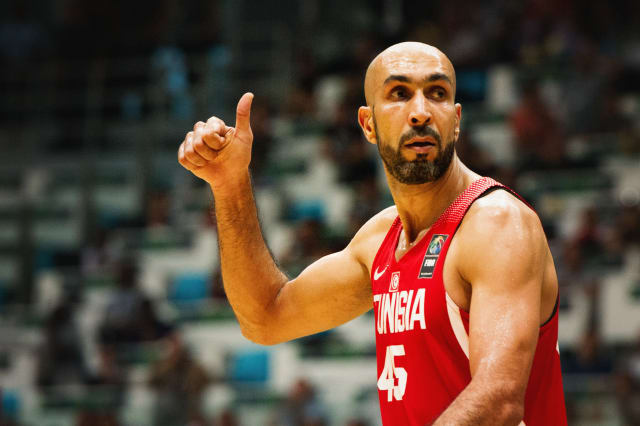
But, as a team, we moved on as we learned from our mistakes.
After that 2001 African Championship we started building a new generation of players who grew up together.
I finished as the top scorers at the 2005 AfroBasket in Algeria, and I was the leading scorer at AfroBasket 2007 in Angola also.
I didn't play at 2009 AfroBasket due to some issues with the [Tunisian Basketball] Federation. At 2015 AfroBasket I left the team three days before the tournament after a disagreement with our head coach.
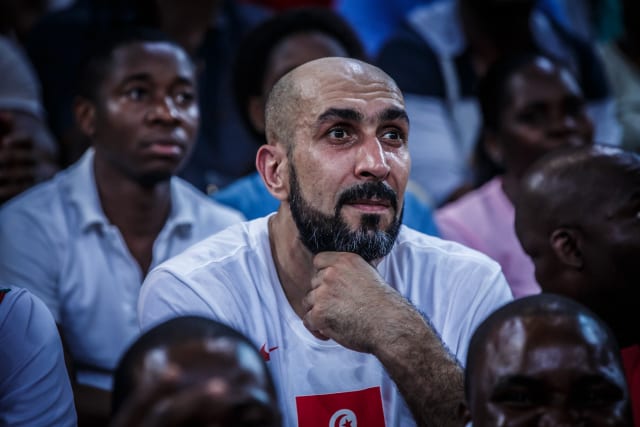 Radhouane Slimane counts seven AfroBasket caps, he sat out two editions of AfroBasket [2009 and 2015]
Radhouane Slimane counts seven AfroBasket caps, he sat out two editions of AfroBasket [2009 and 2015]
Obviously, along the way we played some good and bad tournaments, but it was part of the learning process. We are the team we are today because of those early days experiences.
In the process, the Federation, led by Ali Benzarti, was able to sign good and quality coaches from Portugal, Serbia, Germany, France, which boosted our development as a team. We started playing European style basketball.
By 2011 we were a group of confident and experienced players. Beating a very strong Angola team in the Final by nine gave us a lot of motivation and purpose. The 2011 African title really changed our lives and basketball careers.
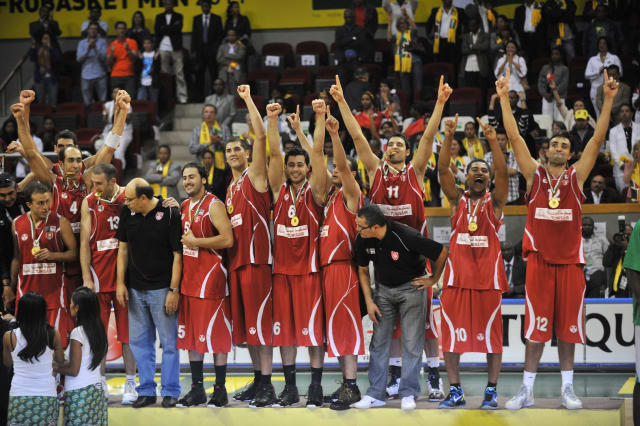 Tunisia clinched their first AfroBasket title in 2011 in Madagascar
Tunisia clinched their first AfroBasket title in 2011 in Madagascar
However, 2017 was a special year for me and for Tunisian basketball in general.
We played co-hosts of the 2017 AfroBasket, and the atmosphere of playing in your home country in front of almost 20,000 fans was spectacular though winning the 2011 AfroBasket in Madagascar was equally special as few people expected us to win the title.
An athlete's careers is made of ups and downs, and my worst moment playing for the national team happened at 2013 AfroBasket in Cote d’Ivoire.
We were the African-defending champions, we were the favourites to win the title again. We had the same roster from 2011, we were more mature as a team, but things didn't work out our way.
We started the tournament with three straight wins in the Group Phase, but the unexpected happened in the Last 16 Round against Egypt. They had lost all three Group Phase games, but, somehow, Egypt came up stronger than us, and just like that, we were out. It was a terrible experience for all of us on the team.
"KIGALI IS A BEAUTIFUL CITY. I'D NEVER IMAGINED THAT KIGALI WAS SUCH A WONDERFUL PLACE. IT'S CLEAN, GOOD INFRASTRUCTURES, GREAT BASKETBALL AREAN, AND LOCAL PEOPLE ARE WELCOMING."
This year must the last chance for my generation to win one more African Championship. Players like myself, Salah [Mejri], [Mohamed] Hadidane, [Omar ]Mouhli might retire from the national team after Kigali. Our goal is to go to Rwanda and win the title one more time. The generation coming after us, will need time to get used and be able to win another title. We are going with a new coach [].
As I look back in my career, I am happy to say that I have accomplished some big things, and becoming an Olympic is something that you can't forget, especially because of the atmosphere and nature of the Olympics.
In the Olympic Village you come across all the best athletes in the world; you are able to play against the most talented players on the planet that you're only able to watch on the TV.

Even though we didn't win a single game at the London Olympics, we played quality basketball. Losing by four points against team like France was an encouraging result for us. We led Lithuania until the last three minutes; against Argentina we led by eight points in the last quarter, and so on. We experienced some good moments at London 2012.
Many years have passed since the London Olympics, but we still have vivid memories of it.
Of course I do remember the episode involving [Mohamed] Hadidane and Kobe Bryant. Hadidane was wearing a pair Kobe Bryant shoes during the game against the US. And at the end of that game, he asked Kobe to sign his own shoes. It was laughable, but we all found it hilarious.
There have been some funny stories. I remember LeBron James dunking on Hadidane, and the first thing he did was approaching our bench and asked: "Was it a good poster dunk or not?” We all laughed at him and said: “Yes, it was a good one.”
Unlike other guys, I have not asked for autographs to any US player, but I asked Coach K (Mike Krzyzewski) for an autograph because I love and admire his approach to the game.
As I mentioned earlier, we have experienced some unforgettable basketball moments in our country, but we still face some challenges.
For example, the old problem in Tunisian basketball is that we don't have basketball agents. Even after our national teams' participation at the World Cup and the Olympics we still don't have agents. For Tunisian players to be able play abroad they need to have their own contacts, otherwise you go anywhere. If you play for the national team you have chances of being spotted by a scout, who eventually, might refer you to clubs.
I remember in 2005, when I was the leading scorer of the AfroBasket in Algeria, Mario Palma, who was the head coach of Angola, approached me and said: "Slimane, I have seen you on a number of AfroBaskests, you're an excellent player, why don't you try and play in Europe?" I responded: "Thanks, coach, but I don't know anybody or agent to help me move abroad. And so, he helped me to sign my first professional contract overseas. I signed for Barreirense FC in Portugal and played under coach Mario Gomes. In Portugal, I managed to rank about the top-10 players in many categories, rebounding, scoring.
After my experience in Portugal I received offers to play in Spain (Malaga), but at the time, I chose a better finance opportunity in Dubai and Saudi Arabia. And so, I became the first Tunisian-born player to play professionally in Europe in 2005.
There's a lot of enthusiasm about the start of the Basketball Africa League [BAL]. I have won the 2011 FIBA Africa Champions Cup 2011 while playing for Etoile Sportive du Sahel.
But the BAL is different because the investment involved in it. It's going to be a big event. he BAL will bring a different perspective of basketball in Africa. The opportunity of playing against quality teams is something that I am looking forward to.
Monastir is for sure a great title contender, the team is great, we have seven players from the national team, with 3 or 4 quality foreign players, we are good team. Many African teams are highly experienced in this type of competition. Teams like Petro and Zamalek could be challenging for us. But at the end of the way, we’'e going there to win the [BAL] title.
Kigali is a beautiful city. I have never imagined that Kigali was such a wonderful place. It's clean, good infrastructures, great basketball arena, local people are welcoming. I love the country and Kigali in particular. It was a great experience visiting Kigali. The city has everything to hold fantastic competitions like the BAL and AfroBasket.

I'm going to turn 41 in August and I have played generation of players (laughter), and I have played against some excellent players at AfroBasket, it's difficult to pick the best of them, but some can't be forgotten.
Some of my favourite afroBasket players are: Luc Mbah a Moute (Cameroon), Olimpio Cipriano (Angola), my friend Boniface N'dong, (Senegal) who was the MVP at AfroBasket 2005, Al Farouq Aminu (Nigeria) and Mouhammad Faye (Senegal).
We have excellent players in Africa, it's just a matter of National Federation and local clubs start promote and give players more exposure.
By Radhouane Slimane